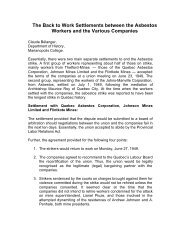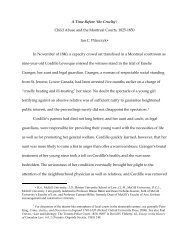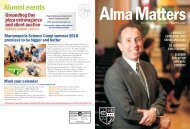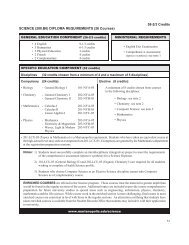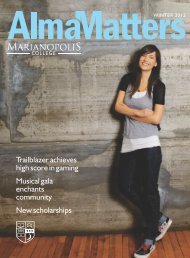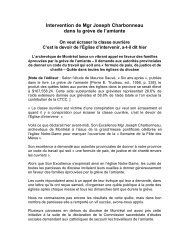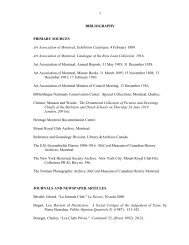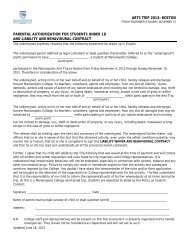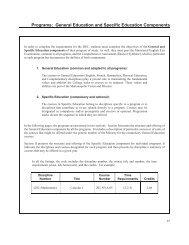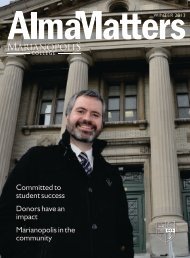2012-2013 Academic Year Calendar - Marianopolis
2012-2013 Academic Year Calendar - Marianopolis
2012-2013 Academic Year Calendar - Marianopolis
You also want an ePaper? Increase the reach of your titles
YUMPU automatically turns print PDFs into web optimized ePapers that Google loves.
General Education: Humanitiespractices and policies related toslavery, segregation, immigration,citizenship and civil rights. Thecourse also explores how popularculture and the arts reflect andinfluence choices made by a society.Students are encouraged to formulatea framework for approaching similarissues in today's society.Ethics and MusicThis course explores some of theways musicians and composers havenegotiated complicated moral terrain.Through a series of case studies,students explore the roles ofcomposers and musicians inhistorical contexts and talk about theirmusical production in terms of ethics.The course covers a large historicalperiod, from Renaissance Italy androyal and religious patronage, throughthe Second World War and the role ofmusic in Nazi Germany, and, cominginto the late 20th Century, protestmusic, Bob Dylan, copyright, andother popular music subjects.Ethical Issues in ArtThis course deals with questionsof ethics in the artworld. Therelationship between art andtechnology is explored, usingexamples from photographyto cyberspace. Ethical issuessurrounding art in the 20th and 21stcenturies with the advent of film,video and the Internet are examined,along with how these have beenutilized by artists to raise awarenessof political and social issues. Thecourse also addresses the role of artin providing resistance with regard toissues such as racism. Gender issues,feminism and the role of womenartists are explored, along with postcolonialperspectives, issues ofownership surrounding art objects,repatriation, and environmental art.Ethics on StageThe artist is often seen as a societaland political conscience. Using thisviewpoint as a framework, the classexamines the rights and responsibilityof the artist, as well as how this ideacan be used and abused by both theartist and society. Focusing most oftheir attention on the art of theplaywright, students examine anumber of twentieth-century playscripts and then explore in aparticipatory and analytic mannerin order to discover how differentartists view society and what theyfeel the big societal questions are.Environmental EthicsMany people are concerned abouta variety of environmental issues,from pollution to global warming tothe extinction of species. They saythat we “should” do somethingabout those issues. But what ethicalassumptions underlie this “should”?Is it a concern for human well-being?For animals? For all living things?For ecosystems? In other words, what“things” count morally? Moreover,what does taking humans, animals,living things or ecosystems into moralconsideration involve? The answersto these questions matter not onlybecause we need to justify our actions,but because different answers mayimply different courses of action. Inthis class, students explore variousphilosophical theories that havebeen elaborated as answers tothese questions.Ethics and GlobalizationThis course examines the ethicalquestions raised by the “new worldorder,” characterized by dissolvingborders, intensifying economiccompetition, and shifting globalstructures. Two broad themes guideour study. The first, “globalizationand North America,” focuses onthe current quest for internationalcompetitiveness and its impact onCanada, the United States andMexico. The second area,“globalization and the new worldorder,” extends the discussion toexplore the more general contoursof the “new world order.”Ethics and DemocracyWhat are the fundamental ethicalprinciples on which democraticpolities are based? What are thehistorical origins of democracy inancient Athens? What did the ancientGreeks and other great philosophersthink about the abilities of the peopleto rule themselves? How did theEnglish, French, and AmericanRevolutions contribute to thedevelopment of democracy?Why did the Russian, and otherCommunist revolutions, reject basicdemocratic principles and humanrights and repress fundamental civilliberties and political freedoms? Howwell have the United States, Canada,and other democracies lived up totheir own democratic ideals? Whatare some of the basic ethical issuesfacing democratic societies today?These are some of the questions thiscourse will attempt to answer.Video GamesThis course focuses on importantethical and social issues associatedwith video games. Students arerequired to consider video gamescritically and analytically from avariety of perspectives. The first partof the course provides students withthe historical, technical, cultural andphilosophical background necessaryfor them to accomplish this. Thesecond part of the course focuses onspecific social and ethical issues, such44



